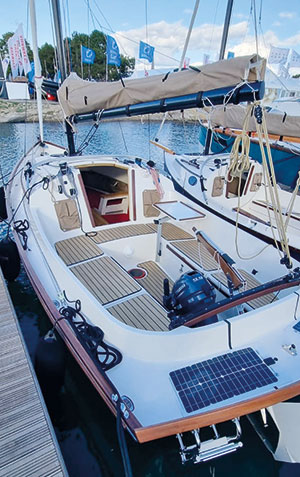
Hot Topic: OUTBOARD ENGINES VS INBOARD FOR SAILING BOATS
 Boat builder Matt Newland, from Swallow Yachts, explains the benefits of using outboard engines on sailing boats, and why he continues to choose Yamaha outboards to power his range of 20 – 26ft daysailers.
Boat builder Matt Newland, from Swallow Yachts, explains the benefits of using outboard engines on sailing boats, and why he continues to choose Yamaha outboards to power his range of 20 – 26ft daysailers.
As a boat builder, you want to ensure that you are building a boat that is truly fit for purpose for your clients. Our boats combine a classic look with modern and efficient performance, a performance that we have found is enhanced by using outboards as opposed to inboard diesel engines.
Weight
Our sailing boats are trailerable, and when designing a boat to be trailered you are always concerned about the overall weight. Increased weight also impacts on performance. Outboard engines have a better power-to-weight ratio than inboard engines, meaning you can go the same speed under engine but for a lot less weight. For example, a 9.9hp Yamaha outboard weighs about 40kgs while an inboard of about the same horsepower weighs around 100kg. Plus, there is the shaft, propeller and exhaust system to take into consideration. So, the weight is easily double when directly comparing the two.
 Lifting clear of the water
Lifting clear of the water
One of the biggest advantages is that an outboard engine can be lifted clear of the water. This means the engine does not sit there ‘fizzing’ away when you leave the boat on a mooring or in the marina and, when you are sailing, there is less drag because you are not dragging the prop or engine leg through the water – making the boat more streamlined and efficient.
If you get anything wrapped around the propeller, you can lift the outboard and clear it rather than having to dive in under the boat and untangle it.
Also, when launching off a trailer, you can tilt the outboard so you can launch in much shallower water than if you have a fixed inboard propeller sticking down below the bottom of the boat. In addition, with an inboard you also need to go into the water much deeper with a trailer, which means that your trailer bearings get wet, leading to more maintenance issues with the trailer.
Economy and servicing
Less weight and less drag in the water means less fuel used. Servicing is also easier as you can take the engine off and drop it into a service agent. Outboards are cheaper too – by the time you have done a full installation of an inboard, it tends to be double or even triple the cost of buying an outboard.
Steerability
Another key benefit of outboards is that they are steerable. You can steer with the outboard tiller to make an extra tight turn, and to vector the thrust in whatever direction you want.
Previously, the only drawback for us of using outboards was the perception of reliability. It is why we chose to work with Yamaha who, we believe, offer higher quality and more reliable engines. We have been boat partners for years, and I honestly cannot remember having a warranty issue. We certainly do not have a problem persuading customers to go with a Yamaha outboard – we have built nearly 90 of our Bay Cruiser 23 and only two customers chose to have a diesel inboard, so nearly everyone sees the advantages and chooses an outboard.
The post Hot Topic: OUTBOARD ENGINES VS INBOARD FOR SAILING BOATS appeared first on All At Sea.
